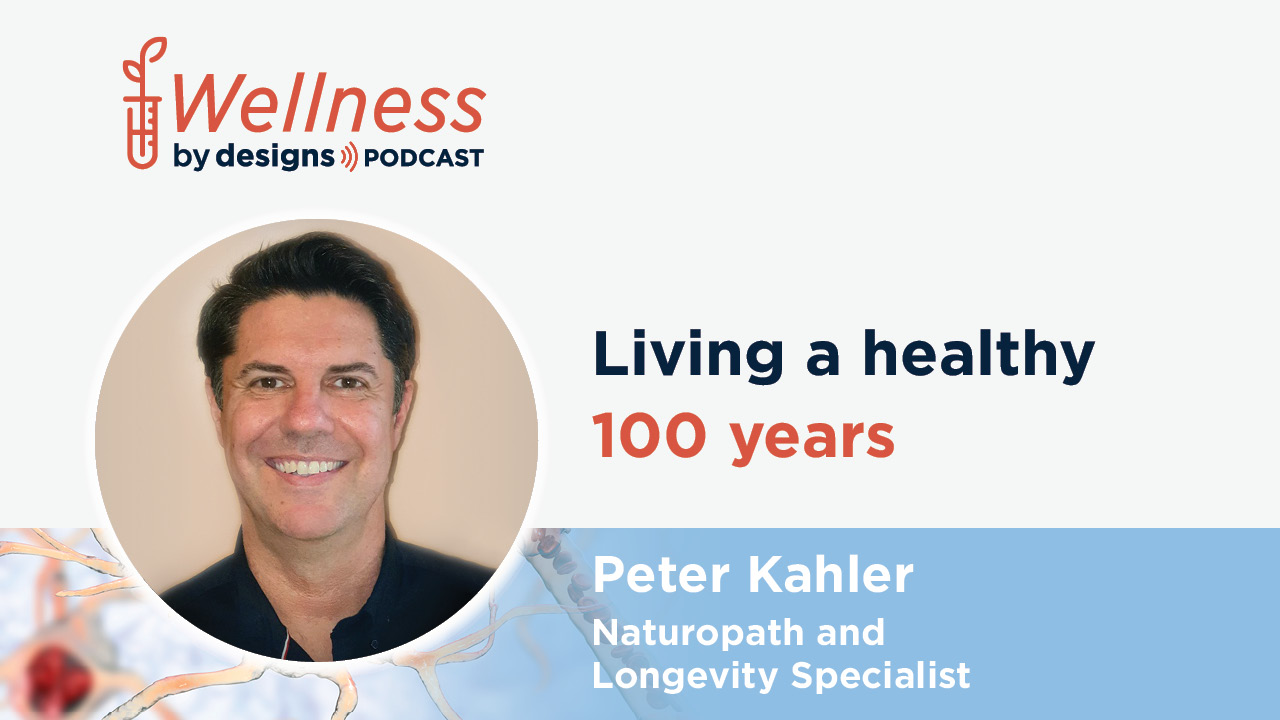

Living a Healthy 100yrs
joining us today is Peter Kahler, a naturopath with over 30 years of experience in the longevity life hacking experience and today Peter chats to us about how we can live to a HEALTHY 100 years!
About Peter Kahler:
Since 1986, Peter has been involved in many forms of Nutritional Medicine and Functional Food development. This resulted in Peter starting one of Australia’s busiest Wellness Clinics – Oxford Naturopathics, Anti-Ageing and Wellness Centre. He currently still consults here today.
Peter has been guiding thousands of people to better health and wellness using Integrative Therapies including:
- Musculoskeletal work,
- Nutritional Medicine,
- Diet & Lifestyle Education,
- Bioenergetic Medicine, and
- Phytomedicines.
Peter also specialised in Chronic Degenerative Diseases. This includes:
- Heart Disease,
- Diabetes,
- Muscle and bone loss
- Inflammatory Disorders, and
- Digestive Dysfunction especially related to the microbiome.
For the last 10 years, Peter has been focused on the effects of Human Ageing and Cellular/DNA Damage. Scientific advancements now allow us to identify and track those damaging effects. After tracking, Peter provides solutions using nutrigenomic compounds to protect and repair your cellular defences and activate your own body’s regenerative capabilities.
Passionate about Biochemistry and how food molecules influence all cellular activity, Peter embarked on an extra decade of education to enable him to create effective strategies and health programmes and deliver them in a systemised way. Peter loves getting the root cause of all health issues to ensure effective treatments and lasting cures.
Connect with Peter:
website: www.naturopathics.com.au
Facebook: https://www.facebook.com/OxfordNaturopathics
Email: peter@naturopathics.com.au
Transcript
Introduction
Andrew: This is “Wellness By Designs” and I’m your host Andrew Whitfield-Cook. Joining us today is Peter Kahler, a naturopath with over 30 years experience in the longevity life hacking experience. Welcome to “Wellness By Designs,” Peter, how you going?
Peter: Yeah. Thanks, Andrew, very very well. Really looking forward to, you know, discussing all the new research that’s coming out on longevity medicine and starting to get people’s awareness into what they can do to live longer and healthier.
Andrew: Well, indeed, that’s what we’ll be talking about today. We’re gonna be talking about how you can live a healthy 100 years. So, exactly what are we talking about here? We’re not just talking about like age hacking and things like that, correct?
Peter: That’s exactly right. I mean we talk that phrase “anti-aging,” you know, and really what we’re talking about is, you know, longevity medicine. So, anti-aging is more the nips and tucks, this is what people understand is anti-aging medicine, the nips and tucks, the cosmetic surgeries, the things that we can do to look younger and improve the visual side of things. But the reality is that that’s like…I class it as icing on a rotten cake. You know, the inside is aging and we’re really degenerating inside but we’re looking great on the outside. So, there’s a big difference between anti-aging and longevity medicine or longevity hacking. Longevity is more looking at what we can do at a cellular level with our mitochondria, with the way that inflammatory processes work, the way our genes and epigenes work, trying to extend life but also having a healthier health span while we’re living longer. So, there’s a big difference between anti-aging medicine and longevity medicine.
Andrew: I totally and utterly. I mean how many times have we seen, you know, the trout pout? And those people that have done continual anti-aging treatments to the point where their smile looks like a joker. Their decolletage is like crepe paper. So, they might have done the surgical nips and tucks, as you say, but it certainly hasn’t helped them to optimally age.
Peter: Exactly. And I’m not against, obviously, doing some outside interventions but not at the expense of what we’re doing internally. So, the inside, exactly, we wanna be able to, you know, there will be less work to be done on the outside if we start working more heavily on that internal process. And I always say, “Longevity,” you know, “and anti-aging is an inside job.” You know, we say that naturopathically as well, our symptoms are coming from something that’s being problematic internally. So, that’s where we have to start and then work out.
Andrew: Well, let’s talk about some of these hallmarks of both healthy but also diseased or poor aging.
Peter: Yes. So, longevity medicine, a lot of the research has been going down into a new group of analytics, if you want, around aging. And they call it “the nine hallmarks of aging.” And these hallmarks are specifically around what’s going on at a cellular level, what’s going on at a genetic level, what’s going on at a lifestyle level, which is then causing further degeneration, further inflammatory processes, you know, cell breakdown. All those types of things which can lead to accelerated aging. And we’re talking about the pace of aging. So, really, somebody can be 50 years of age but actually be, on the inside, at their cellular level, being 60 or 70 years of age. That’s what we have to be dealing with. And those nine hallmarks of aging are focusing on those areas.
So, we do have, you know, genetic instability, we’ve got, you know, signalling problems in cells. We’ve got senescence, so, the death of cells which clog up our systems. We’ve got inflammatory pathways that are working overtime, unfortunately. We’ve got a lack of absorption of nutrients. We’ve got a whole range of these things which are classed as the hallmarks of aging. So, my particular focus is on dealing with those hallmarks and trying to bring about a change in that pace of aging and slow aging down.
Andrew: How do we assess somebody’s aging and how well or how poorly they’re aging? What sort of parameters do we use and how or what’s the evidence behind these, behind using these?
Peter: Yes. So, in my mind, I’m wanting to tackle the knowns first. So, when I’m dealing with, you know, a patient sitting in front of me, it is tackling those known things that we can see those disease progressions, we can deal with the biomarkers that we can actually test for. And then we start tackling the unknowns. And they’re talking about the genes, the epigenes, some of those processes.
Now, interesting the unknowns, we’re getting so much more science coming through now on how we can test for these unknowns. So, we can test for telomere length, we can test for stem-cell pools, we can test mitochondrial function, we can test a number of those things now. But, you know, it is dealing with the knowns first which naturopathic medicine excels in. And those disease states and how people are living and what they’re doing to drive disease and then getting into some of these other underlying markers that we’re testing for in longevity.
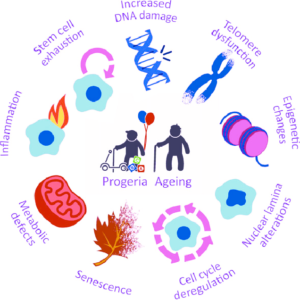 Andrew: Now, that’s something that interests me greatly, the telomere-length assessment. How do we do this?
Andrew: Now, that’s something that interests me greatly, the telomere-length assessment. How do we do this?
Peter: Okay. So, a number of labs now are putting together some great testing processes to be able to do through blood testing specifically and through biopsy testing as well, tissue testing. So, soon it will become more an available test for everybody to be able to do, obviously, through normal pathology work. But at the moment, it’s quite specialized. And especially here in Australia, we do have to send away for a lot of those tests to be done.
However, there are other pathology biomarkers if we wanna treat ourselves a little bit like Sherlock Holmes, that detective work that we can do to ascertain how much damage is occurring through chromosomes, how much damage is occurring to the mitochondria. We can see those within normal pathology tests now. So, gleaning all that information together is where we start. And then as more and more testing gets brought on for us, as practitioners, to use, to test our patients, we can start to paint a deeper picture more effectively.
So, they are doing some testing now to try and set up, giving us a biological age, looking at our epigenetics, looking at the way that we’re aging and giving us a specific age that we can focus on and see whether we can get that changing. If that test comes back and says somebody’s 63, can we get that down to 55? Can we get that down to 45? These are some of the exciting developments that are starting to come in anti-aging and longevity medicine.
Andrew: So, this is something that interests me greatly. We’re in the era of genetic testing. And despite those naysayers in the early days, it’s here. We’re now seeing even really quite orthodox uses for like, you know, drug pharmacodynamics and things like that. But epigenetics, now this is something where I’m not sure that we can test. Tell us about how we test for that? Do we go back to the biochemical parameters to test the effects of what we’re doing with the genes?
Peter: Yes. So, that is specifically what a lot of the labs are doing now is they’re working with artificial intelligence and using the AI applications and the advances in AI medicine to be able to map millions of various, you know, processes that are occurring within the body. So, looking at biochemistry for sure and the chemical reactions, looking at all the markers that we can test for, even inputting lifestyle parameters in there. Even doing facial recognition and muscle testing and a whole range of these parameters can all be put in to be able to give more of an understanding of how our epigenes are working. Genetic testing is still very very in its infancy. You know, a lot of patients come into me and we’ll sit down and say, “Can you test my genes? Can you do some genetic testing on me and tell me this, tell me that?” and I said, “yes, I can do genetic testing but we still are very young in our understanding of what we can do with that information, how do we adjust, how do we, you know, modify.”
Naturopathic medicine has some great…you know, I always say nature has the answer, especially in longevity medicine, but we’re still very unsure as to a direction that we can actually take a patient with that gene information that we’ve just tested for. So, going towards the epigenetic type of testing is going to open up a whole world of information about how our body’s working and how we can treat it better.
Andrew: So, you said something really interesting there about certain assessments that you can do, like physical assessments. So, I’m wondering about not just maybe a skin check but, you know, using AI to maybe take, you know, a scanning photo, almost like you’d try and detect a mole. You know, that sort of microscopic or close-in view of the skin, looking at wrinkles and things like that. So, I’m just seeing so much opportunity here. Forgive me, my mind’s whizzing here with things like how you would be able to test the effect of, say, taking collagen or doing a detox or stuff like that. Is that where we’re at?
Peter: Yes. Yes, absolutely. And it’s interesting, my love of this type of science came about, as a child, watching “Star Trek.” You know, and you would take a person into the medical room there and they would do a whole-body scan. So, they go over the whole system, scanning the body, and then all these computers would come out and start telling you information. Now, we’re not there yet, obviously, with being able to tell everything, but that was so fascinating to me. And these are the types of tests that we’re starting to put together now to ascertain, as I said before, the pace of aging, you know, degenerative processes and how effective our treatments are in reversing some of those processes. So, looking at the skin, looking at eyes, looking at face shape, listening to the voice. The sound of the voice can actually also tell us a lot about different disease states that are developing or the state of our body. Doing muscle tests, especially things which we know now, group tests and various things like that which can give us an understanding about how we’re aging at a muscular level. Bone density tests, you know, all the biomarker tests, microbiome tests, looking at the diversity of the microbiome. There are so many various tests now that we can do. It’ll be fascinating to see all of that information being put into one particular diagnostic or the information pack for a patient so that we have it all there rather than having to do, you know, 50 different tests.
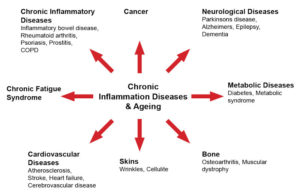 Andrew: You said, you know, we’re not there yet but I also take the point that, back in the days of “Star Trek,” we didn’t have CT scans, we didn’t have MRI, we didn’t even have things like, you know, this very exciting stuff like conical CT scans for cardiac imaging where you can actually do a 3D movable image of the heart. So, we’ve made great advances but we obviously need to go further. I love this utilization of AI in looking at not just one or two genes but a massive cluster of genes because…you know, I think I was looking at something around autism the other week where, you know, it first started off with there was one or two genes indicative of being implicated with autism, and then there was 9, and then there’s 32.
Andrew: You said, you know, we’re not there yet but I also take the point that, back in the days of “Star Trek,” we didn’t have CT scans, we didn’t have MRI, we didn’t even have things like, you know, this very exciting stuff like conical CT scans for cardiac imaging where you can actually do a 3D movable image of the heart. So, we’ve made great advances but we obviously need to go further. I love this utilization of AI in looking at not just one or two genes but a massive cluster of genes because…you know, I think I was looking at something around autism the other week where, you know, it first started off with there was one or two genes indicative of being implicated with autism, and then there was 9, and then there’s 32.
So, we’re going to need the utilization of AI to check this utilization of massive numbers of genes where they’re switched on or off. Maybe not the progression of…sorry, maybe not the existence of a condition which might be imprinted, you know, when the zygotes meet but the expression of that.
Peter: Yes, and that’s where really the research that I’m most excited about is around the epigenetics, as we know, it’s the epigene which is determining how our genes are functioning, expressing themselves. We can switch genes on, we can switch genes off, you know, we can obviously bring better protection around, you know, our genes. And that’s where I think a lot of the research should be focused is on our epigenetics.
And we look at big spenders now, we’re looking at Elon Musk and Bezos, you know, putting, you know, billions into the anti-aging and longevity research arena. I think we’re going to be seeing some massive moves, over the next decade, in longevity medicine, in testing, and in various drugs and interventions that can be used to influence, you know, genes and disease states and epigenetics. So, I’m very excited about that.
I think one of the things that I’m doing, from a practitioner perspective, is I’m trying to improve people’s bodies, make them as healthy as possible, make them as strong as possible, undo as much of the damage that I can do naturally while we wait for some of these interventions to be developed that they can go in there. They’re gonna have a lot better body to be able to deal with when they’re doing these interventions, you know, down the track. So, you know, there’s a lot to be done now, there’s a huge amount of work to be done now while we wait for some of these new discoveries to be proven and brought in mainstream medicine.
Andrew: Gotcha. You were talking about, you know, Elon Musk investing billions, and others, Bezos, is this where the previous attempts at longevity and anti-aging failed like, for instance, Resveratrol? We saw it working in primates but it failed in humans. But it’s one, you know, flavonoid-rich component, herb if you like, whereas, obviously, we don’t rely ever on one magic bullet, particularly with anti-aging, particularly with individual make-up of people. Is this where you think the failings have been shown, because of a lack of money?
Peter: Yes, yes. I think the lack of money, the lack of, you know, the amount of scientists that are actually working on it, you know, we’ve gone from 10 scientists we’ve gone to 50 scientists, we’ve gone to 100 scientists. We now probably have 1,000 scientists around the world that are dedicated to, you know, the science of longevity medicine and looking at these, you know, processes. We just need more hands-on debt, we need more money to be put into testing. You know, and then, you know, coming back to Resveratrol and your comment about Resveratrol, while it wasn’t shown to be the huge influencer on sirtuins, there is still massive benefit that comes from Resveratrol around heart disease, around some of those longevity gene networks, how it activates some of those networks.
So, you know, while a particular ingredient might fail in one particular type of test, it shows benefits and so many other types of tests. And we need the AI to be able to gather all that information and be able to give us ideas and even dosages on how to use some of these molecules to treat and how to reverse disease with them. So, money, time, and hands-on deck, so to speak, is what’s really required. And that’s where I think the big investment’s going to see some leaps and bounds in our discoveries.
Andrew: What can naturopaths do to have a positive effect on their patients’ longevity, healthy longevity?
Peter: Yes. So, straight away, from a naturopathic perspective, the work we do with our patients already on a day-to-day basis is looking after longevity and anti-aging. If we’re reversing heart disease, if we’re lowering inflammatory processes, if we’re improving bone density, if we’re getting people out making better changes, helping their sleep, you know, helping their diet, helping their activity and their fitness, lowering their stress responses, these are all things that we do daily with our patients in naturopathic medicine. We are straight away improving people’s lifespan and healthspan.
The next step, which is where I’m focusing on with my patients, is going into that longevity, you know, the gene network, looking at things like AMPK, Nrf2 cell defences, lowering oxidative stress to cells, helping to lengthen telomeres, helping senescence or using senolytics to go in, the term is autophagy. So, going in and eating up all these dead cells that are clogging up the system and clearing out the body. Looking at trying to improve mTOR and some of these genes, genes, these genetic networks are things that we can do right now to activate and to regulate and to keep as healthy as possible. While we’re doing other work, you know, with our patients in improving their pain, improving, you know, the symptoms that they’re worried about, improving their underlying health concerns. So, we can be doing both together, that’s something we can do right now, as practitioners.
Andrew: Even the simple lifestyle advice, like you’re talking about increasing strength versus exercise, which I think is a real key thing, but anyway, but movement rather than, you know, exercise on one plane of motion. So, for instance, you know, Pilates and even, you know, gardening rather than going to the gym, for instance, and lifting weight in one plane of motion, strength exercises certainly, but also simple dietary advice like, for instance, eating more plants. So, how is this different from that simple lifestyle and healthy-eating advice?
Peter: Yes, okay. So, and you’re right there, there are some fundamental things that we have to get, you know, into our patients’ lives and trying to support them if we talk about movement. You know, we know that sitting is inflammatory, moving is anti-inflammatory. So, you’re right, movement is most important. And you look at the blue zones around the world, those countries where people are living over 100 years of age, disease-free and still having a life of adventure and time with their family and their community, they haven’t been to gyms, they don’t go into gymnasiums and work out, they’re working, they’re moving, they’re being involved with their community and still having a purpose in life. So, movement, you know, Pilates, yoga, walking, swimming, life is really what we’re talking about there, from an activity perspective.
You know, we can possibly work a little bit more around diet in the sense we know the Mediterranean diet, as far as all the longevity studies have been going on with regards to genetic and epigenetic changes, the Mediterranean diet has been found to be most successful and is the most studied diet for longevity we’re talking about here. But intermittent fasting, calorie restriction, that then starts to come into the diet where we’re working a little bit more in activating some of the longevity genes, activating autophagy, lowering inflammation, lowering insulin responses, those types of things around eating not as often through the day or not as much food going in, putting it in a 6 to 8-hour window rather than eating for 12-14 hours a day. Which a lot of my patients have come in, they have breakfast around 6:30-7:00, they have morning tea at 10:30, they have lunch at 12:30, they have afternoon tea then to keep them going through the dinner, and then they have a snack, you know, while they’re watching telly at night. So, all of a sudden, you know, people are getting 5 or 6 meals in a day over a 12-14 hour period. Much more inflammatory.
So, some of these discoveries and sciences around eating and around exercise are more specific to longevity than they are just good health. And they’re some of the things that I wanna focus on with patients. Sleep, obviously, within that process as well, we’re regenerating and repairing when we’re sleeping. So, trying to get people to improve their sleep hygiene is important.
Andrew: I totally agree with you, with the sleep hygiene, and a good mattress is the basis of it. We just got a new mattress. But you said something just before, and it’s really interesting to me how we thought…do you remember, when was this…20 odd years ago when the in vogue thing was to keep your blood sugars even by having smaller meals throughout the day, smaller more frequent meals was the answer. And yet, I really think we were doing people a real disservice by doing that instead of this intermittent fasting. It’s a total turnabout and a salient lesson, I think, that we’ve had to learn.
Peter: Yes. Although, again…and you and I are both the same, we’ve got our training, we’ve got one foot in traditional old-school naturopathic medicine and one foot in then the more medicalized science naturopathic medicine. So, the old-school, you know, naturopathic medicine was always, you know, “Breakfast like a king, lunch like a prince, dinner like a poor,” eating when it’s daylight only. So really, it has those intermittent-fasting, you know, potentials and ideas, you know, focused into that, and we’ve been doing that for thousands of years, we’ve been teaching people in our community to do those naturopathic…I think the modern-day naturopath is they’re more being taught about that. You know, put something in every 2 to 3 hours, something protein, something fat every 2 to 3 hours, but that’s not the way we were trained as old-school naturopaths if you wanna call us that.
And what we’re looking at with the advances of science and what we can measure, we can now see that every time, obviously, we eat, we’re getting inflammatory processes, we’re getting insulin production, we’re getting a range of these types of, you know, processes occurring within our system. And we don’t even feel that. And we know that that’s causing inflammation every time, you know, that those secretions are being made. So, from a longevity perspective, we wanted to keep, you know, inflammation to a minimum but, obviously, continuing to help people, you know, keep their blood sugars balanced.
And I think, as a clinician, we would always work on reversing that type-2 diabetes or bringing about a better balance within blood sugars and then introducing intermittent fasting perhaps for some more serious patients. But then, you know, in my experience, just bringing people into an intermittent-fasting state does improve their type-2 diabetes, so, you know, and balances out their blood sugars better. So, obviously, it goes both ways.
Andrew: Gotcha. And what about the utilization of things like…forgive me, you spoke about looking at things like mTOR, which has got to do with how we are handling our metabolic pathways with sugar and things like that. But if we’re looking at tests like HOMA-IR, so, the insulin-resistance test, doing things like fasting insulin, not just a fasting blood glucose, are these tests that you employ? And I guess the way I’d like to frame this is can you give us your top five tests and then can we also talk about…I know, this is such a shortlist, I get it. And then can you take us through maybe your top five interventions or herbs or supplements that you’d prefer to use?
Peter: Yes. Yeah, absolutely. Yes, look, that is a challenge when we’re looking at five tests much information to glean. However, you know, from the top, I am looking at inflammatory markers. I will do a panel of all sorts of inflammatory markers to ascertain what’s happening within joints, what’s happening within the heart, what’s happening within the brain, what’s happening within the skin, or any type of inflammatory process I wanna know about it so I can target them with therapy more effectively. And then monitor those. So, a lot of my patients I am checking every 3 to 4 months and then monitoring the changes that we’re seeing in those inflammation markers, obviously, to make sure that, you know, we’re getting the result with the supplements we’re putting in and the molecules that we’re using. So, inflammatory markers are very very important from that perspective.
I’m looking at that oxidative stress. So, I will do oxidative markers and see what’s going on with the cellular membrane, look at what’s going on within our chromosomes, what’s happening with our defence mechanisms. And that’s that Nrf2 process that we wanted to try and activate and get as strong as possible.
I’m looking at gut health, as a naturopath, it’s just longevity 101. You know, all disease begins in the gut, we understand that concept. Looking at the diversity that a person has sat in front of me, you’d be surprised how many people now are missing so many, you know, particular species and strains of probiotics in their system. Looking at the inflammatory process that’s occurring in the gut, looking at that permeable bowel. You know, aspects like that are very important.
Toxicity testing. So, and that, I suppose, goes a little bit hand in hand with inflammation and the oxidative stress on cells, look at what we’re dealing with, you know, what type of detoxification may somebody need, what type of intervention do we have to do to move some of those chemicals and toxins out of the body. You know, there’s lots of testing from those parameters that I’m looking at. Hormone profiles, I’d like to look at that, you know, DHEA master hormone, looking at male and female hormone profiles, human growth hormones, see some of these particular aspects, how much do we have to intervene, how much do we have to boost these things up.
And then, finally, I would be looking at the overall biomarker aspect of the human body just to try and figure out, you know, what people’s sensitivities are, what people’s particular issues, their constitution, where they might be having problems in the future so that we can start keeping an eye on those things.
So, testing, from a biomarker perspective, would go down that pathway with then, of course, sleep profile, let’s assess how they’re sleeping. I use an Oura Ring. So, this is something that’s our medicine, which is digital support for finding out how somebody is actually, you know, aging and how well somebody is living their lifestyle. So, there are lots of different… there are watchers, there’s a whole range of different things we can use. The Oura Ring I use specifically because it’s sleep-focused, focused on our sleep parameters and pathways and how much deep sleep we’re getting, what layers of sleep we’re going into, how long it’s taking, our oxygenation. A whole range of things gets measured there. But sleep assessments, dietary assessments, lifestyle assessments, stress assessments, these all come in as part of that picture that you paint for somebody with their lifestyle biomarkers.
Andrew: It’s not something that we can just do a seminar and learn about it and be competent in it, it seems like we’ve, obviously, gotta learn a hell of a lot more about how you individualize and tailor assessments and treatment. Peter, where can we learn more about this?
Peter: Okay. So, there are a lot of courses being offered now around the world in longevity medicine from the Buck Institute of Aging, from the University of Singapore, from deep-learning programs that are run in Silico and places like that around the world. So, people can hook into those and do those courses, they’re all online. We do have here in Australia the Australian anti-aging academy, so, A5M, who specifically do courses and examinations and testing around longevity medicine and how to help people live longer. A4M in the States, you can also hook into those types of institutions to learn more and to understand more.
A lot of my medicine, of course, and the way I treat has come over sort of a 10 or 12-year process before a lot of these courses were available and looking at, you know, disease reversal. And I think that’s one of the things that I’ve done in my practice is test and measure, test and measure, test and measure. And as you found things that we normally would’ve thought, “Ah, that should work for somebody,” you know, and it’s not working for them, “why?” “Do I get the dosage wrong? Am I too far downstream? Do I need to move more upstream to get an effect? What am I missing?” that’s where a lot of my experience and knowledge came with longevity medicine. And now, of course, all these courses are available for people that build more deeply into it.
Andrew: A lot of people buy supplements like green supplements, for instance, green foods, you know, wanting to detox their body. But how much weight, how much investigation should we be doing into the sources of these ingredients in those supplements, looking for organic sources, for instance?
Peter: Yes. So, the process really is…I mean the better we can use organics, you know, obviously, the better, you know, from a naturopathic perspective but it’s very very difficult to get everything organic. It’s very difficult to find those. And if you do find them organic, they’re so expensive to you, so, the costs become prohibitive for the average patient sitting in front of us. So, it’s more coming down to, you know, understanding what we can use now through the companies that we’ve got here, in Australia and New Zealand, that we can use those products to our advantage, you know, the herbs that we use and compounding. You know, greens, you know, when we’re talking about greens, I’m very much into not just utilizing greens but reds and yellows and purples and getting the full-colour of the rainbow, as many colours as possible, that spectrum of colours, where all the rich polyphenols and antioxidant content is and get that into our digestive system.
You did mention before and asked a question which I didn’t answer about some of my favourite molecules or plants that I would use, but definitely, you know, Resveratrol, looking at Withania, looking at astragalus, looking at the ginsengs, looking at magnesium, looking coenzyme Q10, ribose. You know, these are all fantastic…Dunaliella, an algae that helps with stem-cell pools and vision and the beta-carotene aspect. There’s so many of these wonderful…that’s why I say, “Nature has the answer,” so many wonderful molecules and chemicals, you know, involved in our plants that we have right now that we can use to our advantage in the longevity field, to activate these genes and to get the longevity network working better and a lot of study and research going into those over the last 5 years.
Andrew: Peter, there’s so much more to learn about this. I hope one day that I can change my telomeres to more appropriately reflect a younger age. But I don’t know how much they can do about my jowls, which are genetically imprinted. Peter, thanks so much for taking us through this.
Peter: No worries. Thank you very much for the opportunity to have a chat and talk through this. And yes, there’s a lot more to discuss over the coming years.
Andrew: There’s a lot more to discuss. Thanks so much for taking us through this today. It’s very very interesting.
Peter: Thanks, Andrew.
Andrew: And thank you, everyone, for joining us today. Remember that you can find all of the show notes and the other podcasts on the designs for health website. I’m Andrew Whitfield-Cook, this is “Wellness By Designs.”



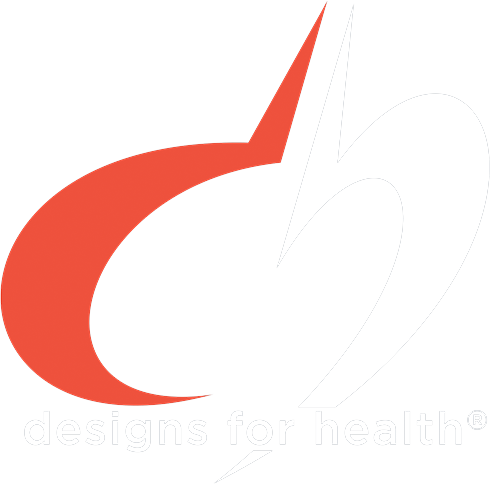


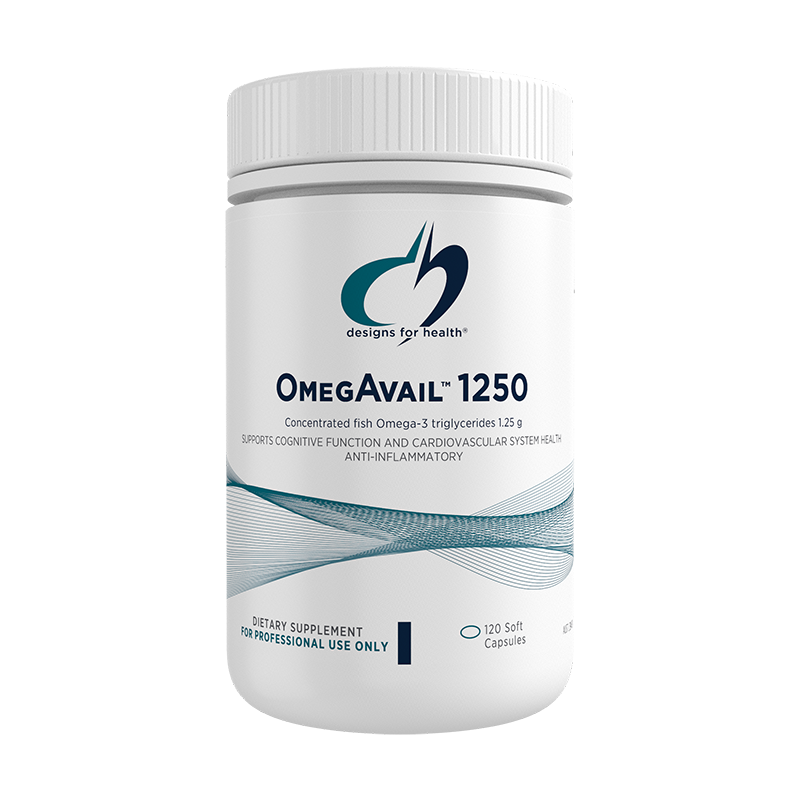
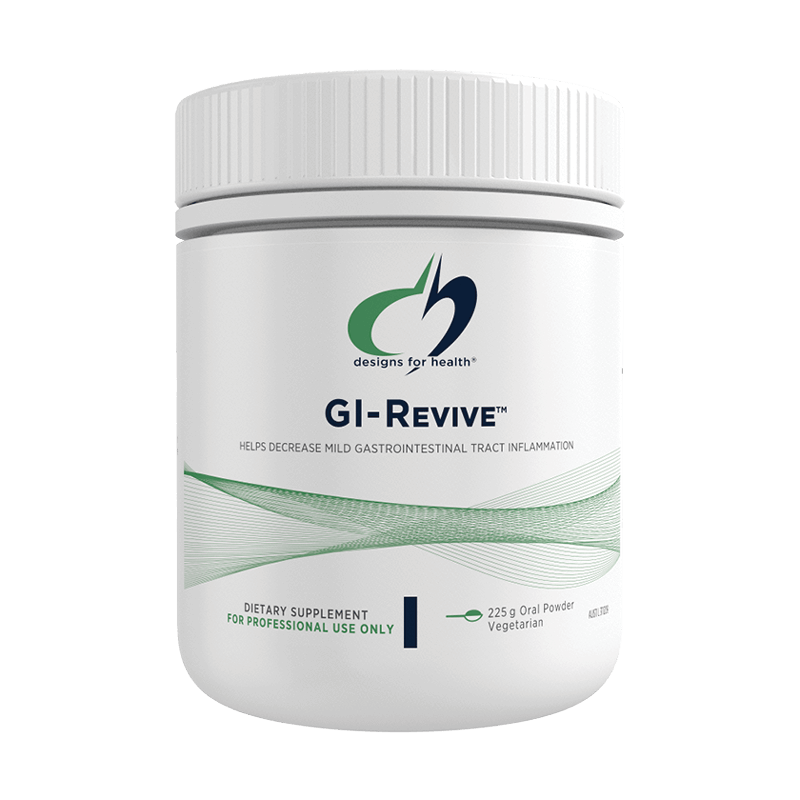
 Essential Insights into Gallbladder Function and Care with Amie Skilton
Essential Insights into Gallbladder Function and Care with Amie Skilton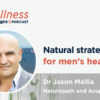 Natural Strategies for Men’s Health with Naturopath Jason Mallia
Natural Strategies for Men’s Health with Naturopath Jason Mallia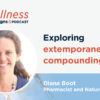 Exploring Extemporaneous Compounding with Diana Boot
Exploring Extemporaneous Compounding with Diana Boot